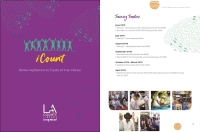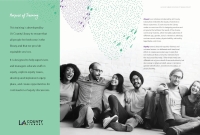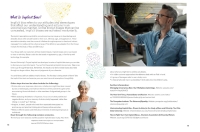The iCount Initiative: Removing Barriers to Equity
County of Los Angeles Public Library, Calif.
Innovation Synopsis
The iCount initiative ensures that LA County Library makes a conscious effort in designing services and programs that equitably address the needs of the diverse community it serves, including customers of different age, gender, sexual orientation, ethnicity, socioeconomic status, physical ability, nationality, legal status and more.
Challenge/Opportunity
The most populous county in the U.S., LA County is strikingly diverse, with residents desperate for life-altering opportunities. Poverty rates are high, homelessness is rampant, young men of color are overly represented in the juvenile justice system, many LGBTQ youth are living on the streets and untold numbers of young people cannot read at grade level. To face overwhelming challenges like these, LA County Library created iCount to tackle inequity and barriers to access systemwide.
Key Elements of Innovation
With 87 libraries serving 3.4 million residents, iCount demanded a strategic implementation to systematically address each community’s unique needs. In 2017, the iCount Leadership Committee presented an Equity Training Toolkit to supervisors, who would then conduct trainings with staff on implicit bias and cultural competency, with scheduled topics: (1) July - Laying the Ground Rules for Discussion, (2) August - What Is Our Current Experience in the Library?, and (3) September - What Can We Do to Support Equity?
Achieved Outcomes
After trainings, each library and division developed a Library Equity Action Plan, outlining one inequity to address this year. LEAPs were implemented in early 2018, with final outcome reports due this June. The second annual supervisor training was held in May; staff will soon develop a new LEAP for 2018. By empowering staff as change agents knowledgeable of local community needs, the library can take over 100 steps toward addressing inequities each year.



